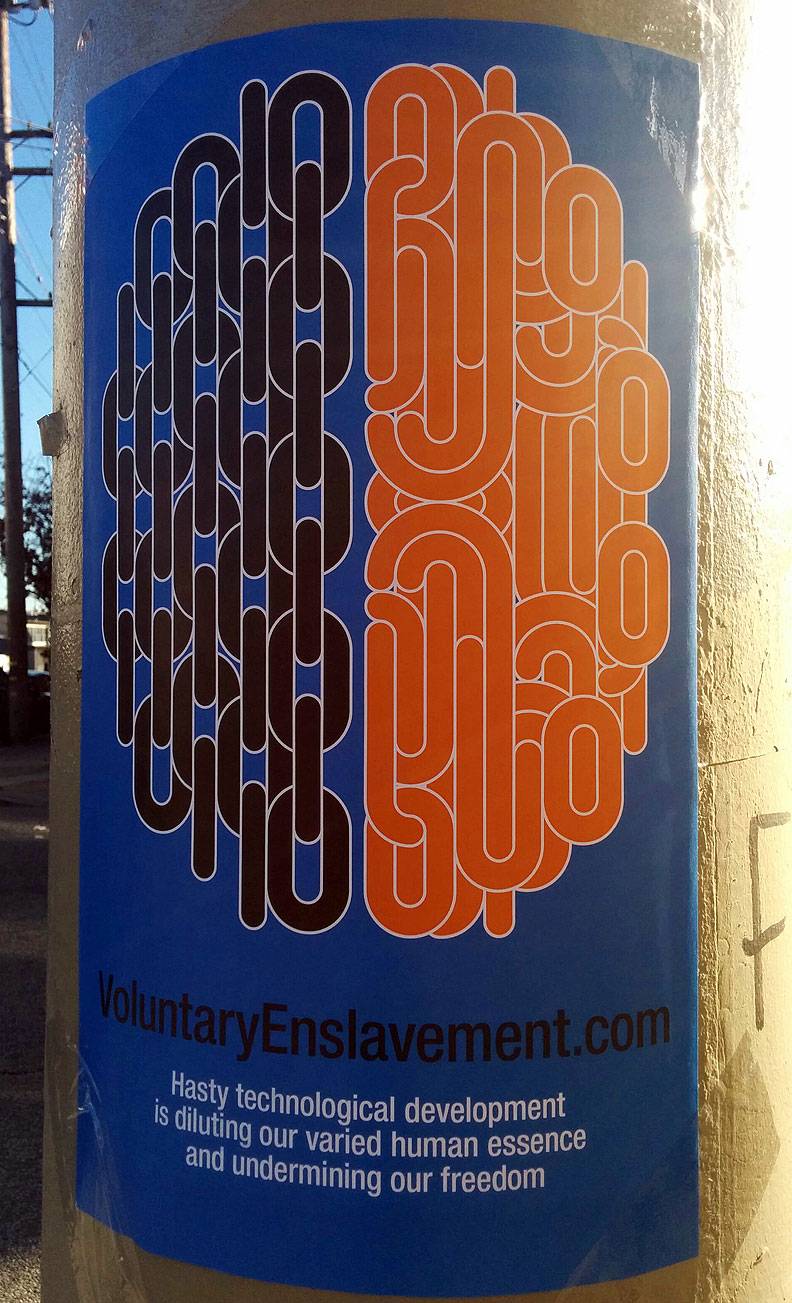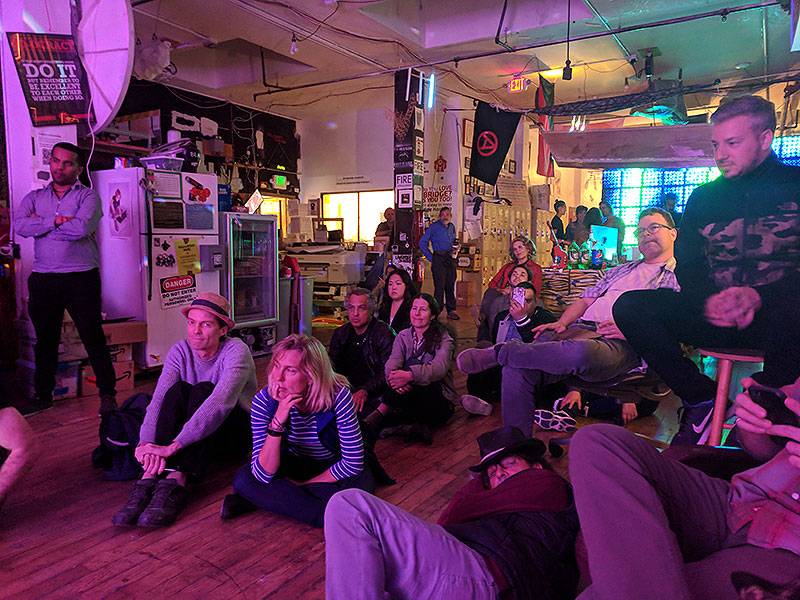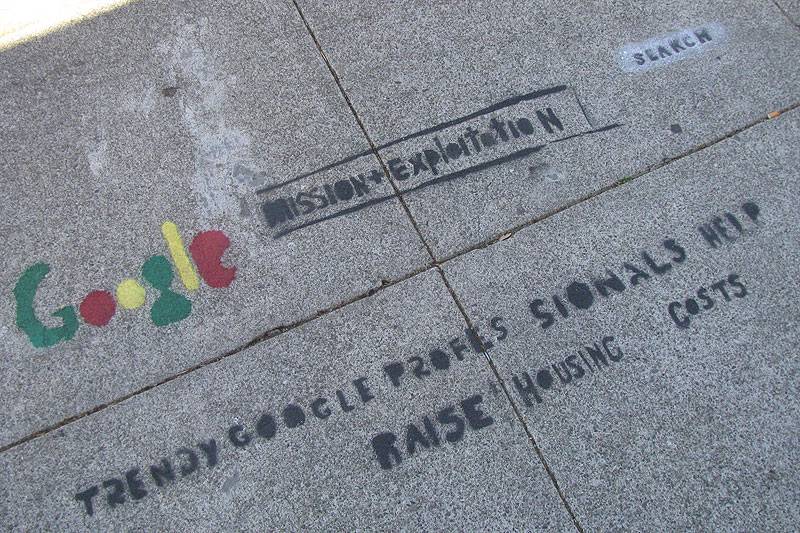Digital Politics 101
Historical Essay
by Annalee Newitz, 2004
Originally published in The Political Edge
What Does Information Want? To Be Free!
When Does It Want It? Now!
Known equally for its unconventional culture and sprawling techno-scientific industrial complex, the California coastal landmass stretching from George Lucas’s LucasArts ranch in Sausalito down to the Google campus in Mountain View is a hotbed of digital politics. Given the social geography of the region, it’s not surprising that Silicon Bay has spawned a thriving population of radicals, inventors, and other malcontents eager to challenge the status quo. But what is surprising, at least for people involved in more conventional political movements, are the sorts of issues that matter to geeks.
Poster on Mission District telephone pole, 2015.
Photo: Chris Carlsson
Activists and organizers in the community blend a weirdly socially responsible version of libertarianism with what can only be called market-minded socialism. Although it’s hard to reduce digital politics to any single set of concerns, of-ten they are preoccupied with access to cultural resources—whether those resources are pieces of art, frequency bands on the electromagnetic spectrum, information about government surveillance, or the source code that makes up a piece of software.
But politics as such are rarely discussed among techies. Instead, geek activists and community leaders in the Bay Area simply view themselves as particularly intrigued by making certain changes in the social order. Freedom may be an ethical imperative, but it’s also a form of community optimization. At least, that’s what many of the region’s most ardent, wired organizers would say. What follows are introductions to a few representatives from the politicized geek community who have inspired their fellow nerds to act up, speak out, rethink received wisdom, and demand changes in the system.
Crowd at a public lecture at Noisebridge, the Mission District-based hacker space, 2018.
Photo: Chris Carlsson
The Hacker: Fyodor
After reading Fyodor Dostoevski’s Notes from the Underground as a teenager, Fyodor chose his online monicker and started to hack in earnest. Among programmers, he is legendary for writing a software tool with the modest name Nmap. Nmap is so widely known that it even made a cameo appearance in Matrix Reloaded, when hacker hero Trinity uses it to break into a power plant computer and rescue the imperiled Neo. “I almost did a dance when I saw it up on screen,” Fyodor told me with a grin.
Working from his home office in Mountain View, Fyodor spends his days doing what he loves best—programming, hacking, and socializing with fellow geeks online. Although hackers have gotten a bad rap in the media, Fyodor embodies the original meaning of the term, which he defines as “playing with computers and pushing hardware and software to its limits.” He also values the hacker community he’s helped create with Nmap—tens of thousands of Nmap users and developers subscribe to his email lists and offer him feedback on the constantly evolving tool. Fyodor makes money by licensing a commercial version of Nmap to corporations, but most people use his free software version of the program—anyone can use it and modify it as much as they like as long as they don’t sell it.
“There are positive political/social/technological goals which keep me coding until the sun rises,” Fyodor explained in an e-mail. “One of the goals has always been to promote free systems like Linux over Windows. Nmap is a way to give back to the the free software community that had given me Linux, gcc, emacs and so many other valuable pro-grams.”
But Nmap carries political risks as well. Some lawmakers would argue that using Nmap can be a criminal act—indeed, one user was brought up on criminal charges for scanning someone else’s machine using Nmap (the case was eventually dismissed). What makes Nmap so dangerous? The program is a port scanner, which means it looks at ports—doorways between a computer and its network—to see whether the computer is open to receive information and, in some cases, what kinds of software that computer is currently running. While Nmap is generally used as a network diagnostic tool—essentially, to make sure you haven’t left any ports open that might let in hostile code like worms or viruses—it can also be used for what Fyodor calls “network exploration.”
You can use Nmap to roam the Internet, peering into people’s ports at random, just to gather information about who has left their virtual windows open. Armed with this knowledge, it would be possible for a hacker to break into those computers through ports that their owners had unknowingly left in a vulnerable state. Using Nmap on the Internet is analogous to using a toolbox to take apart your car engine and see what makes it run. Car manufacturers, however, would rather that you go to a licensed repair facility if you’re going to take your car apart. This essentially allows them to maintain control over your property even after you’ve bought it. Fyodor invented Nmap to help people take back that kind of control from the companies and people who constrain the design and functionality of Internet public spaces.
“While it is true that Nmap can be used for negative purposes, those are overwhelmed by positive ones,” said Fyodor. “I like to encourage network exploration and understanding. Like a lot of things, the Internet is even more fascinating and powerful when you understand and control how it works under the covers.”
His position, which is held by many politicized software developers, can ultimately be understood as a kind of tech-no-populism. Fyodor wants Nmap to empower users, to help them fully understand the Internet rather than simply using it. Given how much information and personal data we entrust to corporations on the Internet, it’s crucial that we have tools that allow us to explore this space and discover for ourselves how secure or insecure it is. The fact that Fyodor makes his tool available as free software helps advance his cause and allows thousands of other people to participate in making Nmap even more flexible and powerful. Fyodor and other Nmap users are pushing for what Princeton computer science professor Ed Felton calls “the freedom to tinker,” the ability to take apart and explore the devices we use every day without corporate or government interference.
The Dork: Karen Marcelo
Karen Marcelo once told me that she’d gotten into building robots because she likes “to blow shit up.” A former re-searcher at Xerox PARC, Karen has designed remote-controlled robotic creatures for Mark Pauline’s monster robot performance troupe Survival Research Labs as well as for half-robot performer Stellarc. A longtime San Francisco resident who left the Philippines as a young adult, Karen once wrote a chunk of code that allowed a person in the U.S. to shoot a gun in Japan. Today, she is the organizer of a popular San Francisco nerd salon known as Dorkbot.
Dorkbot started in New York, but one of its most successful spinoff ventures has been San Francisco’s version of the event, which is billed as “people doing strange things with electricity.” Once a month, a group of programmers, artists, and hackers get together in a San Francisco art gallery to share their latest inventions. Usually there are two or three speakers, and the audience asks questions. Occasionally, Karen will host an “open dork,” where anybody can get up on stage for a few minutes and talk about their work.
Art from the Tetrahedonism project, Karen Marcelo.
“Our politics are very anarchist and do-it-yourself,” Karen explained to me over coffee. “We recently had a speaker who set up his radio transmitter to broadcast from a lunchbox, which is very illegal,” she said. “We had a class on how to tap into the power lines and get electricity for yourself. Or how to set up antennae to get the Internet for free. Why pay some giant service provider when [local free wireless ISP] SFLan offers it for nothing? Also, we’ve done several sessions on how to generate your own media. Among the Dorkbot people, there’s this idea that you can’t rely on the press—you have to be your own media.”
Karen says that what makes Dorkbot such a success is that it fosters community. “People meet here and then start projects together,” she said, adding that the founders of Indymedia met through Dorkbot and that several of Matt Gonzalez’s biggest supporters were also Dorks. “I’m not sure what Matt has in common with us, but there’s clearly something,” Karen mused. “I mean, we’re not exactly environmentally sensitive—I have pictures of Mark [Pauline] standing in puddles of gasoline. And we frequently unplug pipes using M16s. That can’t be good for the environment.”
Nevertheless, the politics of Dorkbot clearly do share territory with grassroots, indie political campaigns. Liberating technology from its corporate context, Dorks want to turn castoff engines into art and invite ordinary citizens to infect the media with their own ideas about freedom. When electoral politics seem to be failing, and the media cover-age of the war in Iraq features only the current Administration’s point of view, it’s easy to see why disgruntled tech-no-savvy citizens might want to cook up their own media culture in response.
The Activist: Ren Bucholz
After he finished up an undergraduate degree in media studies, Ren Bucholz came to work at the Electronic Frontier Foundation (EFF) as an activist. A nonprofit digital liberties think tank in San Francisco, EFF focuses on legal and policy issues around electronic privacy, free speech, and intellectual property. As the organization’s Activism Coordinator, Ren—who describes himself as “a traditional liberal lefty”—runs outreach campaigns to educate the public on everything from the perils of electronic voting to the rights of people who are being sued by the Recording Industry Association of America (RIAA) for copyright infringement. He sends out action alerts on EFF’s massive e-mail lists, works with other organizations on shared issues, and coordinates letter-writing campaigns. Of course, when you work on digital liberties, activism can take unusual forms: Ren described giving a speech in an online virtual world called There, where he handed out virtual EFF t-shirts that the avatars in the game could wear.

Ren Bucholz
“What’s fun and frustrating about the issues we work on is that a lot of the time we’re the first to do it,” Ren said. “We bear the burden of educating lawmakers and judges and the public about emerging issues and that is a huge job.” But, he added, EFF has grown a lot in recent years because many issues that once seemed to touch only the lives of geeks are now mainstream concerns. “File sharing is a good example of that,” Ren said. “Suddenly this issue is making national headlines, but EFF has been working on it for years. I could say the same thing about electronic wiretap-ping and searching people’s e-mail.” The USA-PATRIOT Act made Internet evesdropping—long a concern of EFF staff—into another hot-button issue.
Ren feels that the Bay Area has a strong digital activist community, but he pointed out that one of the best parts about his brand of activism is that it’s so easy to engage in a national or international campaign without ever leaving your office. “Groups don’t have to be in the Bay Area for us to work with them,” he explained. “With the electronic voting issue, I have an affinity group with a representative from Working Assets, one from MoveOn, one from Verified Voting, and another from True Majority. We meet weekly via telephone, and when we aggregate our groups, we can reach about 2 million people across the nation with one e-mail.”
According to Ren, there are really two kinds of digital activism. First, there’s the technically enabled activism that allows him and his colleagues to reach millions of people with the click of one button. Usually this kind of activism involves getting traditional issues groups to have a strong Web presence and to communicate with their members or activists via e-mail. “Technically sophisticated activists can be more nimble and take instant feedback from their constituency,” Ren noted. The other kind of digital activism is what EFF has been doing for years (along with technically enabled activism): dealing with issues where civil liberties and technology collide. Groups like the Electronic Privacy Information Center, Public Knowledge, and the Center for Democracy and Technology are other groups like EFF who focus on digital liberties. And this is where young activist leaders like Ren are most valuable.
Ren is helping the public understand that as new technologies evolve, it’s important to keep tabs on how the government and corporations may use those technologies to manipulate citizens and consumers. E-voting, which has spawned both public protests and lawsuits in several states, is a prime example. Diebold, the manufacturer of e-voting machines adopted across California and elsewhere, has funding from several individuals who are also major contributors to the Republican Party. The voting machine manufacturer is also notorious for altering the software on its voting machines without government oversight. Their machines have also been involved in several suspicious elections. EFF, with Ren’s help, has been heavily involved in the activist campaigns to force voting machine manufacturers to provide voters with an auditable paper trail. If anything goes wrong with the software on the machines, a paper trail guarantees that voters can check to make sure their votes were registered correctly.
The Lawyer: Lawrence Lessig
Perhaps one of the most infamous geek activists of his day, Lawrence Lessig is a law professor at Stanford who has dedicated his life to changing the rules of intellectual property (IP) law. Like Fyodor, who believes everyone has the right to do what we choose with our computers, Larry thinks citizens should have the right to do what we like with public domain creative works.
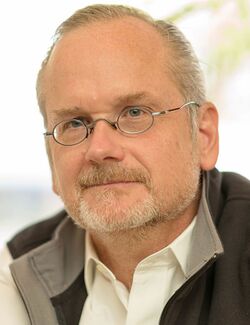
Lawrence Lessig, May 2017
Photo: Joi Ito
Crucial to his argument is the idea that the public domain needs to be expanded. In 2002, he helped create a non-profit organization called Creative Commons that offers authors alternative copyright licensing schemes that grant people the right to reproduce the copyrighted work as much as they like, or to use parts of it in their own work (CC licenses are popular with musicians who want other musicians to use their beats, for example). His work is particularly relevant in the computer age, when it is easy to use parts of other people’s images, music, or movies in your own creative work to make something entirely new.
Larry also argues that copyright extensions have gone out of control, and that we need to cut back on the time that IP owners can keep copyrighted works out of the public domain. The more impoverished the public domain is, he argues, the more we deprive artists and scientists of the raw materials they need to make leaps forward in the artistic and intellectual realms. Taking as his premise that extended copyright terms and draconian punishments for infringement violate the First Amendment, Lessig has argued his cause in Washington D.C., in several books, and (memorably) before the Supreme Court in a suit to repeal the so-called Sonny Bono law, a copyright extension that brought the term of copyright up to 95 years (adding 20 years to the previous 75-year term). Although he lost the case, Larry has continued his fight to expand the public domain and challenge IP hoarders who have made copyright infringement a criminal offense.
In part as a result of Larry’s tireless campaigning, IP reform has become one of the most crucial issues in digital politics. It touches on the natural antagonism between corporate interests and those of consumers, as well as the difficulties artists face as they attempt to work creatively in a medium where traditional notions of copyright infringement no longer make sense.
San Francisco–based public domain advocates such as Rick Prelinger (who maintains a vast digital archive of public domain films) and Brewster Kahle (who runs the Internet Archive, a facility that hosts historical “snapshots” of the Internet as well as Prelinger’s archive, among others) have worked with Larry and Creative Commons to make sure the public has free access to creative works, and can reuse those works in their own media creations.
Another San Francisco nonprofit that has worked with Creative Commons is the Public Library of Science (PLoS), a group of biologists and science writers who are devoted to making the contents of scientific journals accessible to everyone. Currently, most medical and scientific journals are so expensive that it is impossible for people to conduct meaningful research unless they are part of a wealthy institution that can afford to license the content of these journals. PLoS wants scientific knowledge to enter the public domain as quickly as possible, so that medical advances don’t depend on money, but simply on good research. They publish their own free, peer-reviewed biology journals online, and also work with other organizations to push large scientific journal IP holders like Reed-Elsevier to make the articles in their catalog freely available to everyone.
The Blogger: Danah Boyd
“Blogging is a political act in the feminist sense of the personal being political,” Danah Boyd told me over the phone. In the background, I could hear her tapping on a keyboard. Danah is the consummate blogger in an era when blogs are fast becoming the twenty-first-century equivalent of soapboxes. And her Zephoria.org is the only blog in the world about blogging itself. Filled with Danah’s observations about how online connections can be used to understand real-world social relationships, Zephoria is done in typical blog style: Danah posts an entry, often with pictures and links, and people who read her blog can comment on it. A graduate student at UC Berkeley, Danah uses her blog the way other academics might use a study group. Many of her fellow wired academics and analysts read Zephoria and post their latest findings there.
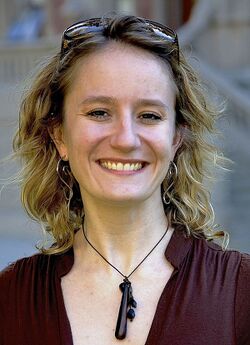
Danah Boyd, 2008
Photo: courtesy Danah Boyd CC BY-SA 4.0
Recently she’s grown more interested in social networking sites—which allow people to post a profile of themselves and link to other people they know, as well as groups they are interested in. Danah is fascinated by the way social networks allow people’s social connections and political communities to be explicit. All you have to do is read some-body’s profile to find out who all their friends and colleagues are.
“Of course you can figure out people’s politics by reading what their blog is about,” she said. “It becomes a political statement, a way of working through identity issues. That’s why some of the most political blogs are involved with queer politics—because that’s about participating in an identity.”
Danah isn’t terribly interested in overtly political blogs like Andrew Sullivan’s. Her work centers on how bloggers and social networkers form webs of trust with other people they meet online and use those trust webs to explore their beliefs. Most bloggers say their sites are about what interests them on a personal level. But Danah has found that often political issues are so crucial to people’s identities that their online presence becomes inseparable from their politics.
“I was fascinated by Friendster during the [anti-affirmative action] Proposition 54 campaign [in California],” she said. “People would put up “no on 54” pictures in their profiles or change their names to be “no on 54.” But this wasn’t something the site allowed them to do—they were breaking out of what the site permitted because it was so important to these people’s identities. This was the kind of moment when politics are so much part of your identity that they become part of your profile on a social networking site.” These are also the kinds of political actions that created such excitement around Howard Dean, which was the first blog-centric, tech-enabled presidential campaign.
Another aspect of social networking politics that intrigues Danah is the fact that putting so much personal information online can be dangerous. An employee at Microsoft was fired in 2003 for posting pictures in his blog that he’d taken on the Microsoft campus. The snapshots were of several Apple computers the company had bought in secret; the employee was fired simply for leaking the fact that Microsoft uses computers from other companies. EFF attorney Kevin Bankston, who is working with Danah on a white paper about surveillance and social networks, is concerned that the government may also use these sites for terrorist witch-hunts in which they place people under surveillance simply because their online profile and friendship network are defined as suspicious. “This is what scares me,” Danah said. While blogs and networks enhance our ability to organize politically, they also make marginal groups more vulnerable to persecution.
The Journalist: Danny O’Brien
A British expat living in Silicon Valley, Danny O’Brien is famous for co-editing an e-mail newsletter called Need to Know (but generally referred to among its thousands of nerd readers as NTK). NTK charts the inside gossip, techno-politics, and pop culture obsessions of geeks who care about social issues.
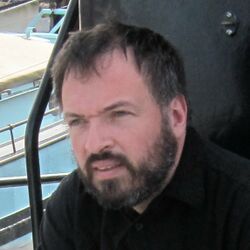
Danny O'Brien, c. 2015
Danny came to the States in 2000 in order to “track the decline of the dot.com boom” for the London Sunday Times. As an observer, he says he sees U.S. geek politics with a “very British eye.” He is sometimes stunned by the liveliness of the grassroots activity here. “Britian has a more tightly knit political community,” he said. “There’s always a feeling that somebody in government will pay attention to your concerns, so there’s little impetus to form long-lasting political movements or subcultures.” But he sees the U.S. as having a very “thin and minimalist” mainstream culture that forces nonmainstream political groups to be more segregated and isolated—and, ultimately, far more organized.
“The Bay Area has a completely self-contained and self-sufficient geek culture,” Danny explained. “I can live and breathe and die geek culture in the Valley and I’d never have to leave [computer superstore] Fry’s—I could raise my kids in Fry’s! They could buy motherboards at one end of the store, and sell them at the other. In the meantime, they’d live on frozen pizza.” Famous for his politically pointed satire, Danny is also dead serious about the importance of this kind of geek isolationism. It can become a powerful organizational weapon when tech-related concerns go political.
Danny recalls one of the most interesting geek activist campaigns of the last several years: the protests over the arrest of Dmitry Sklyarov, a Russian programmer who was detained in a Silicon Valley jail for months because he’d come to the States to deliver a paper on a software tool he’d designed. Software corporation Adobe claimed his tool, which broke the (extremely weak) copy protection on Adobe eBooks, was in violation of the Digital Millenium Copyright Act (DMCA). Until Sklyarov’s arrest, few people had realized that the DMCA had provisions that made it a criminal offense to design software that could be used to circumvent the copy protection measures used to keep people from pirating digital IP.
When the geek community heard that one of their own was being detained for building software—and that his only crime was that one part of his software could be used to pirate eBooks—they were instantly galvanized. “The impact of this geek self-sufficiency is politically very interesting. You have a long fermentation period, and then a burst of activity like the Sklyarov case,” Danny recalled. “Within days of his arrest, there was a big protest, perfectly organized with t-shirts and banners and a website.” Protesters marched outside the Adobe offices while the detained Russian geek got free legal representation from EFF attorneys. Adobe quickly dropped the charges, but the Justice Department pursued the case, and it took almost six months to get Sklyarov out of jail and back to his family in Russia. He is still facing charges in the U.S. if he ever returns.
“You have this instant organization in the geek community, which was originally there for handing out Linux distributions and then gets repurposed for political action,” observed Danny. “Geeks know know how to plan a meetup because they’ve been working hard with their friends on how to build some fuckoff wifi thing—it’s like a big cannon that they direct at something else.”
The Future of Digital Politics
What’s obvious, as of this writing, is that highly politicized digital subcultures won’t be going away any time soon. As the developed world becomes more and more defined by information exchange, computer networks and other communications technologies will be crucial organs of propaganda and free speech. It will be incumbent upon citizens to understand something about how computers work if they are concerned about basic democratic issues like integrity in elections. Also, if they value their privacy, they’ll have to learn about all the ways that their personal in-formation gets circulated and revealed on the Internet. Fundamental, real-world issues like the right to vote and the right to privacy are now heavily mediated by digital machines.
Sidewalk graffiiti in San Francisco, 2015.
Photo: Chris Carlsson
While people in the United States and Europe are familiarizing themselves with weird new ideas like port scanning and electronic social networks, people in the developing world are just beginning to build out their digital infrastructures. Often, international groups like the World Intellectual Property Organization (WIPO) create treaties dealing with electronic IP and media regulation that are extremely disadvantageous for poorer countries. Today, it’s simple for people in the developing world to get decent software because many countries have little or no penalties for copy-right infringement. Want a copy of Microsoft XP in Russia? Just stroll down the street in Moscow and somebody will sell you a copy for a small chunk of cash. When I was in Cuba, a geek told me gleefully, “Windows is free software!”
Developed nations, the IP-holders of the world, are pushing developing countries to sign on to international treaties that will create an even greater rift between the digital haves and have-nots. While people in the Bay Area struggle to give people democratic access to software source code in voting machines, people across the world are fighting for access to digital content, as well as for devices that will allow them to use that content without paying exorbitant, developed-world prices for it. Our struggles go far beyond this rich stretch of land by the bay. Techno-utopians of the early 1990s used to say that the Internet would bring the world together in prosperity, but now we know their predictions were wrong. We’re going to have to fight a lot harder than we ever imagined to reach that utopian Star Trek world where everybody lives in computer-enhanced peace and harmony. But every time somebody releases a new open-source tool, or liberates an idea or device from a large IP-holder, I have hope.
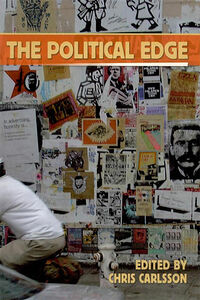
published originally in The Political Edge ed. Chris Carlsson (City Lights Foundation: 2004)

